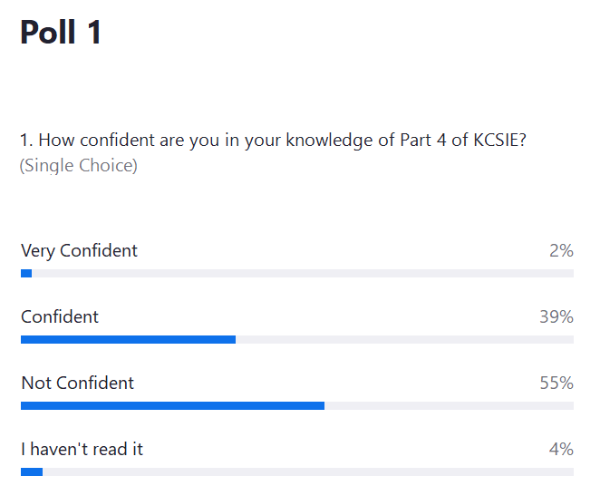Safeguarding and Employment Law: Allegations of Abuse Made Against Staff (concerns that meet the harm threshold)
 07.02.2024_1000.png)
This blog is based on Judicium’s Safeguarding ‘Sofa Session’ from the 7th of February, with our resident experts James Simoniti and Kelly Rayner. This session focused on what processes must staff follow in relation to allegations of abuse made against staff, reporting allegations of abuse and working with the LADO, and the role of HR in allegations of abuse made against staff.
The Harm Threshold
The definition, taken from Keeping Children Safe In Education (KCSIE), is split into four criteria. This states that concerns or allegations meet the harm threshold if an adult has:
- behaved in a way that has harmed a child, or may have harmed a child and/or
- possibly committed a criminal offence against or related to a child, and/or
- behaved towards a child or children in a way that indicates he or she may pose a risk of harm to children, and/or
- behaved or may have behaved in a way that indicates they may not be suitable to work with children.
What about policies and procedures?
Key guidance can be found in Part 4 of KCSIE. We recommend all school leaders and school HR teams should have this to hand or in a quick link to reference.
It informs and guides your school’s policies on managing allegations against staff. Your school policy might be a standalone policy on ‘dealing with allegations’ or included as a section within the school disciplinary policy. Either way, it’s important to ensure you have a clear and transparent policy dealing with how you will approach these matters, who in school is responsible for dealing with them and the procedures to be followed.
KCSIE makes clear there are two aspects to consider when an allegation is made:
- Looking after the welfare of the child
- The designated safeguarding lead (or deputy) is responsible for ensuring that the child is not at risk
- The DSL refers cases of suspected abuse to the local authority or children’s social care, where appropriate.
- Investigating and supporting the person subject to the allegation
- At Judicium we have often seen situations where school leaders respond very cautiously and perhaps act a little too quickly when these matters arise. We recommend taking breath and pausing to seek advice before moving to your next steps.
- apply common sense and judgement.
- deal with allegations quickly, fairly and consistently
- provide effective protection for the child and support the person subject to the allegation.
Poll 1

Demystifying Part 4 of KCSIE
Scenario
We have a 9-year-old child with additional needs. Our teacher in this example has been qualified for ten years and working for the school for the last four years. The child has become agitated and has got up from their desk. The teacher asks the child to go back to their desk. The child becomes more agitated, starts to knock things off a table in the class that has a glass terrarium on it with a class pet lizard living in it.
The terrarium wobbles and slides and the teacher shouts at the child – ‘don’t be a bloody idiot, stop that and sit down now!’
The child pushes the terrarium off the table as the teacher approaches from behind and the teacher pulls the child by the jumper causing the child to fall to floor knocking his shoulder against a desk. The child cries out in pain and is holding their arm crying out. The TA from the class leaves the class to call the Headteacher for help. It transpires that the child has a dislocated shoulder.
What should the school do next?
This matter would be likely to meet the harm threshold. This person has behaved in way that has harmed or may have harmed a child. Let’s imagine that a member of staff witnesses the event and reports the matter to the Headteacher. Let’s look at the school’s initial response.
- The school should ensure that everyone is safe. They should provide first aid if there are any injuries, to the child or anyone involved in the physical intervention and seek further medical assistance if necessary. The DSL is ultimately responsible for ensuring the child is not at risk, but there may well be members of staff better placed to provide the initial support and aid for the child.
- The Headteacher should conduct basic enquiries to determine whether there is any foundation to the allegation. These will be quick and simple actions, such as:
- Checking the sign in system – is that member of staff in on the day of the alleged incident?
- Have any witnesses come forward to report the incident?
- Is there any CCTV covering the incident? What does this show?
- It is important these are only basic enquiries for the time being. If the LADO believes there is a case to answer, and the police are involved, this could jeopardise a police investigation. For example, a defence barrister could question the impartiality of the Headteacher who has conducted an interview of the accused member of staff or may raise questions over any interview about a potentially criminal matter conducted without a solicitor. NB: Do not let this scare you – just ensure the enquires you conduct prior to contacting the LADO are short and sweet!
- If the Headteacher determines there is a foundation to the allegation, they should inform the LADO. This should be done within one working day to ensure the LADO is able to oversee an investigation into the matter from the beginning. If there is ever any doubt, you should be contacting the LADO.
- The LADO has sometimes been portrayed as an authority figure ‘out to get the school’ – but this could not be further from the truth. The LADO is there to support schools and keep children safe. Schools should not be afraid to seek their advice and use them as a sounding board when an allegation is made.
Referral
In this case, the Headteacher believes that the matter should be reported to the LADO. She completes the necessary paperwork and makes a referral the same day. The LADO decides this does meet the harm threshold and has an initial discussion with the Headteacher. The LADO advises the Headteacher to contact the police as she has significant concerns. NB: Some LADOs will ask the school to contact the police. This process may vary in different local authorities, so we would always advise agreeing a clear plan of action with the LADO at the end of each call.
Remember to always record your discussions and decisions made in a secure area.
The LADO recommends the member of staff is suspended. She then arranges a Position of Trust meeting within the next four weeks (these are known by various names, including PoT meetings, strategy meetings or multi-agency meetings).
Focusing on that recommendation – suspension.
From an HR perspective, is this something schools are required to do every time there is an allegation made against a member of staff?
No. Suspension is a decision that rests with the school. The LADO may make recommendations, but it is ultimately for the school to decide. Based on advice from the school or college’s HR provider and/or a risk analysis drawn up with the LADO, the following alternatives should be considered by the case manager before suspending a member of staff:- redeployment within the school or college so that the individual does not have direct contact with the child or children concerned.
- providing an assistant to be present when the individual has contact with children.
- redeploying to alternative work in the school or college so the individual does not have unsupervised access to children.
- moving the child or children to classes where they will not come into contact with the member of staff, but this decision should only be made if it is in the best interests of the child or children concerned and takes account of their views. It should be made clear that this is not a punishment and parents have been consulted.
- temporarily redeploying the member of staff to another role in a different location. For example, to an alternative school or college or where available, working for the local authority or academy trust.
These alternatives allow time for an informed decision regarding the suspension. This will, however, depend upon the nature of the allegation. The case manager should consider the potential permanent professional reputational damage to employees that can result from suspension where an allegation is later found to be unfounded, unsubstantiated, malicious, or false.
If immediate suspension is considered necessary, the case manager should record the rationale and justification for such a course of action. This should also include what alternatives to suspension have been considered and why they were rejected.
Where it has been deemed appropriate to suspend the person, written confirmation should be given within one working day, giving as much detail as appropriate for the reasons for the suspension. It is not acceptable for an employer to leave a person who has been suspended without any support. The person should be informed at the point of their suspension who their named contact is within the organisation and provided with their contact details.
Local authority children’s social care or the police may give their view to the LADO, but they cannot require the case manager to suspend a member of staff or remove a volunteer, although the case manager should give appropriate weight to their views.
The power to suspend is vested in the governing body or proprietor who are the employers. However, where a strategy discussion, or initial assessment, concludes there should be enquiries by local authority children’s social care, and/or an investigation by the police, the LADO should canvass police and local authority children’s social care for views about whether the accused member of staff should be suspended from contact with children.
Police involvement does not make it mandatory to suspend a member of staff; this decision should be taken on a case-by-case basis having undertaken a risk assessment about whether the person poses a risk of harm to children.
Applying this to our case, the Headteacher must risk assess using the guiding principles we have talked through:
Let’s for the purpose of this example say that decision is to suspend:- Ensure teacher is clear on terms of suspension.
- Has a point of contact.
- Has been advised to seek support from union.
- Knows who will be investigating and that he will need to be available for interviews in usual working hours.
- Has been signposted to any other support measures EAP’s available.
Informing Parents and Carers
A vital aspect not mentioned so far is working with parents and carers. Notably, this is something the LADO and police are unlikely to have done. As the party most likely to have a pre-existing relationship with them, you are best placed to inform them.
Parents and carers should be formally told about the allegations as soon as possible. However, this should be agreed with the LADO, police and children’s services (where relevant) because, where there is an investigation taking place, the disclosure of information must be carefully controlled. They should also only be informed of the progress of the case in relation to their child, and not the staff member involved. They must also be told of the requirement to maintain confidentiality and unwanted publicity about any allegations made against teachers in schools whilst investigations are in progress – this is taken from section 141F of the Education Act 2002.
This piece of legislation makes it an offence to publish any material that may lead to the identification of a teacher in a school who has been accused by, or on behalf of, a child from the same school (until there is a criminal charge or the Secretary of State publishes this).
There will also possibly be community tensions around the matter, especially if it is a high-profile incident or details have been shared on social media by parents and carers at the school. Parents should be reminded of this legislation and advice should be sought from the LADO.
While the investigation has been taking place and the school manages this and has reached a conclusion. From a HR perspective, what needs to take place?
Hypothetically, when the matter was referred to the LADO, they contacted the police but the police decided it does not meet a criminal threshold and do not intend to investigate further. The LADO said the investigation can be done internally by the school and the Headteacher appoints the DSL to conduct a full investigation into what happened.
The DSL will have gathered evidence. The DSL interviewed the TA, pupils who witnessed the event and interviewed the teacher.
Furthermore, let’s say the teacher in his interview is NOT disputing what happened. He admitted he shouted and is not disputing pulling the child backwards by his jumper resulting in the fall and injury.
The DSL concludes her report and the LADO calls another POT meeting to discuss.
At the POT meeting the LADO, DSL and Headteacher agree the concerns are substantiated, meaning there is evidence to support the allegation - a child has been harmed.
What next?
A range of options depending on how the school wishes to deal with this.
The LADO may have expressed a view and may make a recommendation but just like suspension, the next steps are ultimately for the school to decide. They should be made on a case-by-case basis, looking at the facts of each case. No hard and fast rules will apply to every case.
Next steps might be:- Deal with it informally, lift the suspension and give guidance, support and training on behaviour management
- The school may decide it warrants a more formal process if the investigation reveals there are concerns about the teacher’s motives or conduct that may breach professional standards as well as inappropriate behaviour management.
- If so, the school may hold a disciplinary hearing with a panel of governors with no involvement to consider appropriate action.
- DSL would in this instance be the Investigating Officer and present the report to the panel.
- At the Hearing would be the opportunity for the employee to respond to the concerns and offer any mitigating factors to be considered.
- Based on what the panel hears at that hearing, the panel may decide on a range of outcomes from informal guidance to a formal written warning right through to a dismissal if the case warranted this.
NB: The important point to take away here is that a substantiated conclusion does not automatically lead to a dismissal. There can be a range of outcomes.
Malicious Allegations
Malicious allegations are rare, but they can be extremely challenging when they are made. Schools should consider whether making the allegations was a ‘cry for help’ by the child, pointing to other abuse that may have taken place, perhaps by another individual. This is not necessarily unusual for survivors of trauma. Keeping Children Safe in Education does also note that disciplinary action may be appropriate for some children that make malicious allegations. These should be in line with your behaviour policy and reflect the seriousness of the matter.
Safeguarding is offering a training session on Part 4 of Keeping Children Safe in Education. If interested in the course or to book please email safeguarding@judicium.com
You can follow us on Twitter: @JudiciumSG @JudiciumEDU
Safeguarding eLearning Courses
The Safeguarding Team can also deliver bespoke, onsite training at your school. Prices start from £495+VAT for 2 hours covering one of the following: Governor training, Safer Recruitment, DSL or All Staff.
If you’d like to review Judicium’s forthcoming sofa sessions please click here
© This content is the exclusive property of Judicium Education. The works are intended to provide an overview of the sofa session you attend and/or to be a learning aid to assist you and your school. However, any redistribution or reproduction of part or all of the contents in any form is prohibited. You may not, except with our express written permission, distribute or exploit the content. Failure to follow this guidance may result in Judicium either preventing you with access to our sessions and/or follow up content.
Related content

This blog is based on Judicium’s Safeguarding ‘Sofa Session’ from the 4th February 2026, with our resident experts Joanne Bocko and Sarah Cook.
.png)
This is a summary from Judicium’s Safeguarding and Thrive ‘Sofa Session’ from 3rd December, with our Judicium Safeguarding consultant Joanne Bocko, Thrive Head of Innovation and Principal Trainer, Viv Trask-Hall and Director of Thrive, Tom Preston. Drawing on decades of combined experience in safeguarding, governance, SEND, leadership, and mental health, the panel unpacked how the framework’s shifts will impact schools, what Ofsted will be looking for, and how leaders can position themselves for success.

This is a summary taken from Judicium’s SEND and Safeguarding ‘Sofa Session’ from 5th November, with our Safeguarding and SEND consultants Rik Chilvers and Simon Hanley. In this session we discuss the new SEND and Safeguarding toolkit and how to best prepare for an Ofsted visit.
.png)
This blog is based on Judicium’s Safeguarding Client Survey Uncovered - Insights from the sofa session from 8th October with our Safeguarding Consultant Joanne Bocko.
.png)
This blog is based on Judicium’s Safeguarding - Back to school: Are you KCSIE ready? sofa session from 10th September with our Head of safeguarding, Kate Massey . In this session we take a look at the key updates for KCSIE 2025, and how best to prepare for the start of the new academic year.

This blog is based on Judicium’s Safeguarding Supervision On The Sofa: Your DSLs Safe Space ‘Sofa Session’ from the 25th June 2025, with our resident experts Helen King and Sarah Cook.

Sofa Sessions | Safeguarding